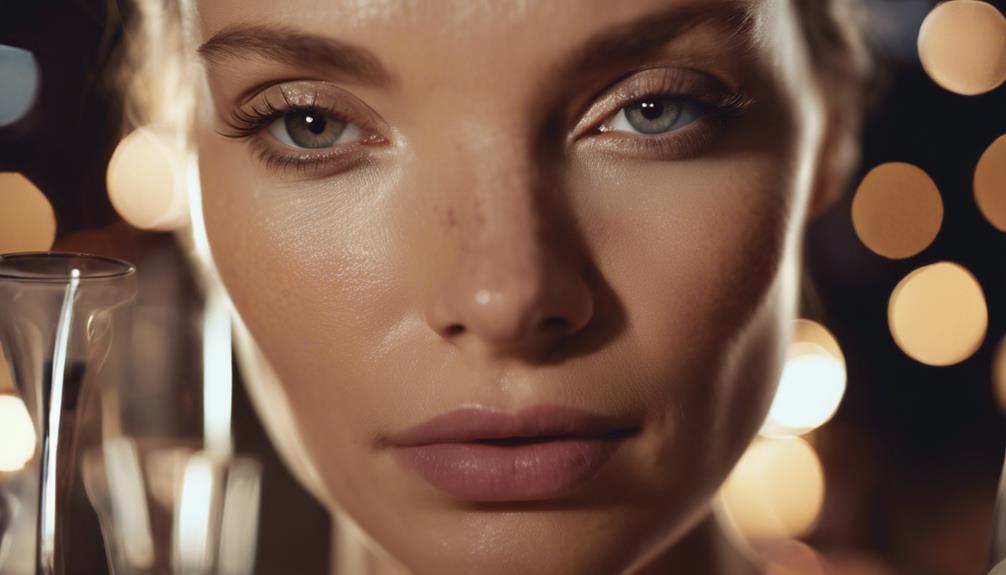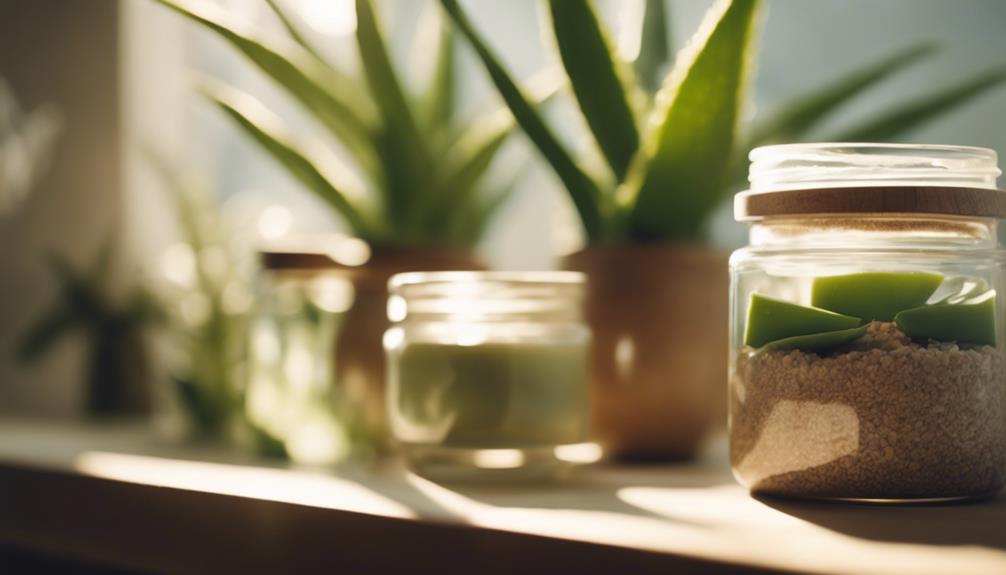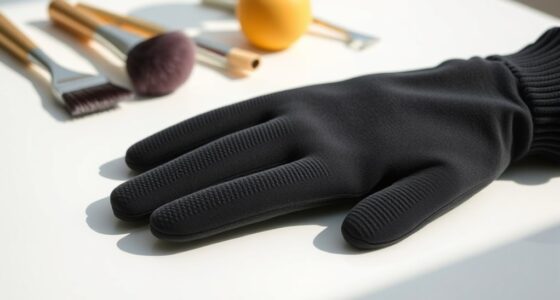Alcohol can wreak havoc on your skin, leading to dryness, irritation, and a dull appearance. It dehydrates your skin, contributing to fine lines and wrinkles, which makes you look older. If you have conditions like rosacea or psoriasis, alcohol can worsen these issues. You'll also notice puffiness and dark circles under your eyes due to sleep disruption and dehydration. Chronic drinking escalates the risk of skin cancers and infections by weakening your immune system. Staying hydrated and moderating your intake can mitigate these effects. Curious about more ways to protect your skin? There's plenty more to explore!
Key Takeaways
- Alcohol consumption leads to dehydration, resulting in dryness, irritation, and accelerated skin aging with fine lines and wrinkles.
- Chronic drinking increases the risk of skin conditions like rosacea and psoriasis, exacerbating redness and irritation.
- Alcohol disrupts sleep patterns, causing dark circles and a tired complexion due to insufficient skin rejuvenation.
- Long-term alcohol use elevates the risk of skin cancer, as it impairs the body's ability to repair UV damage.
Alcohol's Effects on Skin
Alcohol can greatly impact your skin, leading to dryness, irritation, and a host of other issues. When you consume alcohol, it affects your body's hydration levels, resulting in dehydrated skin that looks dull and lifeless. The moisture loss can also contribute to the appearance of fine lines and wrinkles, making your skin age faster than it should.
Regular alcohol intake isn't just about surface dryness; it can exacerbate existing skin conditions like psoriasis and rosacea. If you're prone to these issues, you might find that alcohol triggers flare-ups or persistent irritation, making it even harder to maintain healthy skin.
The diuretic effect of alcohol can also result in puffiness and dark circles under your eyes, as dehydration causes fat deposits to sink and blood vessels to become more visible.
Additionally, chronic alcohol use can lead to long-term skin problems. A weakened immune system increases the risk of skin infections and even skin cancer. So, if you're serious about your skin health, you might want to reconsider that next drink and its impact on your skin conditions.
Short-term Skin Reactions
When you consume alcohol, your skin can react negatively in several ways.
You might notice dryness, redness, and even a dull complexion due to dehydration and disrupted sleep.
These short-term reactions can make your skin look less vibrant and more aged almost immediately after drinking.
Dehydration Effects on Skin
Dehydration from drinking can lead to noticeable short-term skin reactions, leaving your complexion dull and lifeless. When you consume alcohol, it acts as a diuretic, increasing urine production and causing severe dehydration. This moisture loss greatly affects your skin, making it appear cracked, rough, and less elastic.
Here are some immediate effects you might notice:
- Sunken eyes: Dehydration can make your eyes look hollow and tired.
- Dull complexion: Your skin may lose its natural glow and liveliness.
As alcohol metabolizes, it creates acetaldehyde, further drying and irritating your skin. You might find that your skin loses its youthful appearance, appearing older than it really is.
This short-term impact on your skin can be alarming, but staying hydrated before, during, and after drinking can help mitigate these effects. Remember, your skin reflects your overall health, and maintaining hydration is key to a vibrant complexion.
Inflammation and Redness
Consuming alcohol can trigger internal inflammation that shows up on your skin as visible redness and puffiness. This happens because alcohol consumption causes small blood vessels near the surface of your skin to widen, leading to a flushed appearance. As your body reacts to alcohol, you may notice temporary skin irritation, with your skin appearing swollen and irritated shortly after drinking.
Increased blood flow from alcohol can worsen skin conditions like rosacea, heightening the risk of permanent redness and flushing. Additionally, histamine release during alcohol metabolism contributes to this inflammation, intensifying skin irritation. You might find that your skin becomes more prone to breakouts as it reacts to alcohol. This is due to the inflammatory response that can clog pores and irritate the skin, making it more susceptible to blemishes.
Being aware of these short-term effects is essential if you want to maintain healthy skin. Redness and inflammation can be frustrating, but recognizing how alcohol impacts your skin can help you make informed choices about your drinking habits.
Sleep Disruption Consequences
Alcohol disrupts your sleep patterns, leading to visible skin issues like dark circles and a dull complexion. When your sleep is compromised, you may notice your skin looking more tired and aged. The consequences of sleep disruption from alcohol intake extend beyond just your mood; they can notably affect your skin's health.
Here's how sleep disruption can impact your skin:
- Increased Puffiness: Alcohol can cause swelling around your eyes, enhancing the appearance of tiredness.
- Rough Skin Texture: Insufficient sleep hampers cellular rejuvenation, leaving your skin feeling rough and lacking liveliness.
With a recommended sleep duration of at least seven hours per night, it's clear that prioritizing quality sleep is crucial for maintaining ideal skin health. Regular alcohol intake can hinder this, resulting in not just a dull complexion but also a more aged appearance.
Taking steps to reduce alcohol consumption could be a game changer for your skin's overall liveliness and texture.
Long-term Skin Consequences

Long-term alcohol consumption can lead to persistent skin issues, leaving your complexion dry and dull.
You'll notice accelerated signs of aging, like wrinkles and sagging skin, as your body's ability to maintain elasticity declines.
Furthermore, your risk of developing skin cancer increases, especially if you already have pre-existing skin conditions.
Persistent Skin Issues
Regularly drinking can lead to persistent skin issues, including dryness, wrinkles, and a dull complexion, all stemming from chronic dehydration. When you consume alcohol, it impairs your skin's hydration levels, making it harder for your skin to retain moisture. This can result in a tired and aged appearance.
Moreover, alcohol causes your immune system to weaken, increasing the risk of skin infections and exacerbating existing conditions like psoriasis and rosacea. You might notice flare-ups or worsened symptoms as a direct result of your drinking habits.
Consider these long-term effects of alcohol on your skin:
- Chronic dehydration: Your skin loses its natural moisture, leading to dryness and a lackluster look.
- Increased vulnerability: A weakened immune system leaves your skin susceptible to irritants and bacteria.
Being mindful of your alcohol consumption can help mitigate these persistent skin issues, allowing your skin to recover and appear more vibrant.
Taking care of your skin means taking care of your body, so consider making healthier choices.
Accelerated Aging Signs
Chronic drinking accelerates the visible signs of aging, leaving you with more wrinkles, diminished skin elasticity, and a lackluster complexion. Heavy drinking leads to chronic dehydration, which can result in dry skin that lacks the moisture it needs to maintain a youthful appearance. Over time, this dehydration causes your skin to look sallow and sunken, mimicking deeper aging signs.
Moreover, regular alcohol consumption disrupts your body's nutrient absorption, leading to deficiencies that further exacerbate the aging process. These deficiencies can contribute to conditions like psoriasis and rosacea, creating persistent skin issues that only make you look older. The diuretic effect of alcohol also causes fluid loss, diminishing your skin's overall hydration and health.
Increased exposure to alcohol weakens your immune system, making your skin more susceptible to infections and irritations that can age you prematurely. As studies show, heavy drinkers often experience significant reductions in skin hydration and overall dermal health, leading to a more aged appearance compared to non-drinkers.
Increased Skin Cancer Risk
How does alcohol consumption elevate your risk of developing skin cancer over time? Regular alcohol use can markedly increase your skin cancer risk due to several factors. Alcohol impairs your immune system, making it harder for your body to combat skin malignancies. Additionally, it exacerbates UV damage, heightening your vulnerability to the sun's harmful effects.
Consider these points:
- Immunosuppression: Long-term alcohol use compromises your immune function, reducing the body's ability to fight off cancerous skin cells.
- Increased UV Sensitivity: Alcohol enhances the damaging effects of UV exposure, which is a primary contributor to skin cancer.
With these risks in mind, it's essential to be mindful of your alcohol consumption. Limiting your intake can help protect your skin and overall health, reducing the chances of developing serious conditions down the road.
Prioritizing your skin's well-being today can lead to a healthier tomorrow.
Skin Conditions Linked to Alcohol

Heavy drinking can greatly increase your risk of developing various skin conditions, including rosacea and psoriasis. If you're predisposed to rosacea, heavy alcohol consumption might lead to persistent facial flushing and irritation. This can make it challenging to manage and treat. Psoriasis flare-ups also become more common with alcohol intake, complicating treatment for those already struggling with the condition.
Moreover, individuals who engage in heavy drinking are more susceptible to seborrheic dermatitis, which shows up as flaky, itchy patches on the skin. Alcohol can trigger porphyria cutanea tarda (PCT), resulting in blistering lesions due to its negative impact on liver function. If you have a history of liver issues, heavy drinking can worsen these skin reactions.
Additionally, discoid eczema is more prevalent among heavy drinkers, characterized by raised red patches that can be itchy and scaly. Each of these skin conditions highlights the detrimental effects of alcohol on your skin health.
Importance of Hydration

Staying hydrated is essential when consuming alcohol, as it helps combat the dehydration that can lead to dull and lifeless skin. When you drink alcohol, it dehydrates your body, making hydration even more vital.
Dehydrated skin can appear cracked, wrinkled, and dull, robbing you of your youthful glow. To keep your skin looking vibrant, follow these simple tips:
- Drink plenty of water between your alcoholic beverages to help maintain hydration.
- Stick to the UK CMOs guidelines of a maximum of 14 units of alcohol per week to prevent dehydration-related skin issues.
Strategies to Mitigate Damage

To keep your skin looking its best despite alcohol consumption, consider implementing several strategies that can help mitigate its damaging effects.
First, make it a habit to alternate your alcoholic beverages with water. This simple practice promotes hydration and counters the dehydrating effects of alcohol.
Next, always try to consume a full meal before or while drinking; this slows down alcohol absorption and protects your skin health.
It's also wise to limit your alcohol intake to no more than 14 units per week, as recommended by the UK CMO guidelines. This limitation can greatly reduce the risk of long-term skin damage and other health issues.
Additionally, focus on incorporating antioxidants and vitamins into your diet, as these nutrients support skin health and help combat oxidative stress caused by alcohol consumption.
Understanding Alcohol Use Disorder

Understanding Alcohol Use Disorder (AUD) is crucial, as it impacts your ability to control drinking and can lead to serious health consequences. AUD isn't just about how much you drink; it's about how drinking affects your life. Recognizing the signs of AUD can help you make informed choices about your health.
Here are some key characteristics of AUD:
- An inability to manage your drinking habits
- Experiencing withdrawal symptoms when not drinking
The effects of alcohol on your body are profound and can manifest in various ways. Long-term consumption may lead to skin issues like premature aging, redness, and even exacerbate conditions such as psoriasis and rosacea. Additionally, heavy drinking notably increases your risk of developing skin cancer.
The UK Chief Medical Officers recommend limiting alcohol intake to no more than 14 units per week to lower the risk of AUD and its associated health problems. If you suspect you might have AUD, seeking support through treatment options like cognitive behavioral therapy or peer support could be crucial in regaining control over your drinking habits.
Tips for Healthier Choices

Making healthier choices around alcohol can greatly improve not only your overall well-being but also the condition of your skin. Start by alternating alcoholic beverages with water. This simple practice helps you stay hydrated, reducing the dehydrating effects of alcohol on your skin.
Consider choosing low-alcohol options or setting a limit on the number of drinks you have per occasion. This can minimize the risk of skin-related issues that come with excessive drinking.
Before you start drinking, make sure to eat a full meal. This slows alcohol absorption and can mitigate its adverse effects on your skin health. Following the UK CMOs guideline of a maximum of 14 units of alcohol per week can also help prevent long-term skin problems associated with heavy drinking.
Lastly, don't forget your skincare routine. Incorporate products that focus on hydration and repair to counteract the negative appearance effects of alcohol.
Seeking Professional Support

Seeking professional support can be a game-changer in addressing alcohol use disorder and its effects on your skin health. By reaching out to experts, you can gain valuable insights into how alcohol consumption impacts your skin condition and overall well-being.
Here are some key benefits of seeking professional guidance:
- Personalized Treatment: Medical professionals can offer tailored strategies to reduce your alcohol intake while addressing specific skin concerns.
- Support Groups: Joining local support groups, like Alcoholics Anonymous, connects you with others facing similar challenges, creating a sense of community and shared motivation.
Awareness of your alcohol consumption patterns, combined with professional support, is essential for making informed decisions about your health.
Don't hesitate to reach out for help; it's a significant step towards improving both your skin health and overall quality of life.
Frequently Asked Questions
Does Alcohol Really Affect Skin?
Yes, alcohol really affects your skin. It can dehydrate you, making your skin appear dry and dull. Additionally, it may worsen existing skin conditions and lead to increased redness, puffiness, and signs of aging.
Will Quitting Alcohol Improve My Skin?
Quitting alcohol can rejuvenate your skin, reduce dryness, and minimize wrinkles. You'll notice improved hydration, fewer irritations, and a clearer complexion. With better nutrient absorption, your skin's energy will shine through, enhancing your overall appearance.
Is Alcohol the Worst Thing for Your Skin?
Is alcohol the worst thing for your skin? It can definitely harm your skin health. You might notice dryness, redness, and breakouts, making it essential to contemplate how your drinking habits affect your complexion.
How Much Does Alcohol Age Your Skin?
Alcohol can greatly age your skin. It dehydrates, disrupts sleep, and increases oil production, leading to dryness, fine lines, and breakouts. Moderating your intake can help maintain your skin's youthful appearance and overall health.
Does Bathing in Beer Have Any Positive Effects on Skin Compared to Regular Alcohol Consumption?
Bathing in beer for skin is said to have potential benefits, as the yeast and hops are believed to hydrate and nourish the skin. However, regular alcohol consumption can have negative effects, such as dehydration and inflammation, which can negatively impact the skin. Always seek professional advice before trying new skin treatments.
Conclusion
In the grand tapestry of life, your choices about alcohol can weave both vibrant and faded threads for your skin.
Embracing moderation and hydration can help keep your complexion radiant and youthful.
Remember, it's not just about the occasional indulgence; it's about nurturing your skin's health for the long haul.
If you find yourself needing guidance, seeking professional support can illuminate the path toward healthier habits.
Your skin deserves the best, and you have the power to choose wisely.








